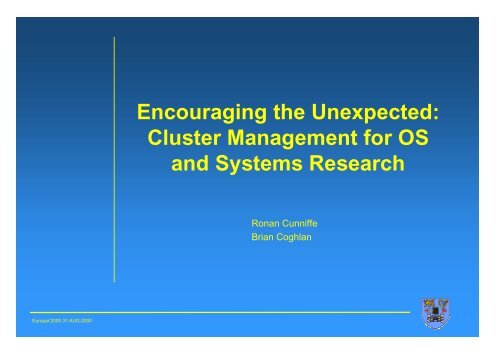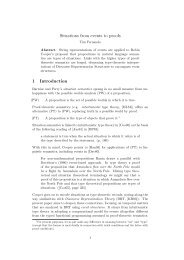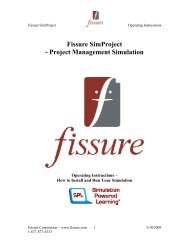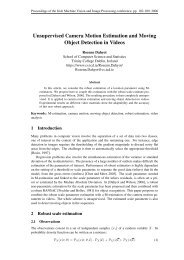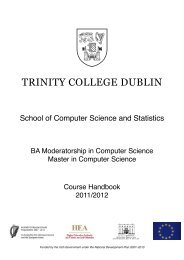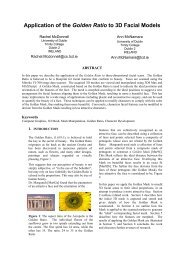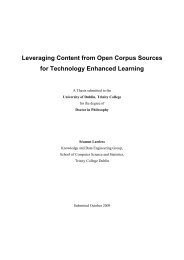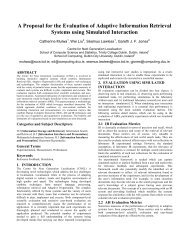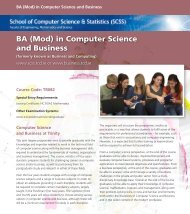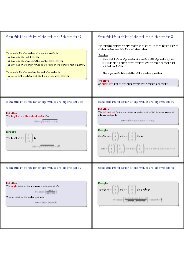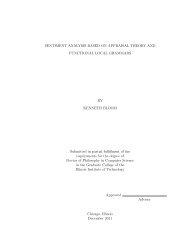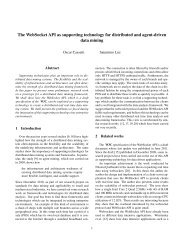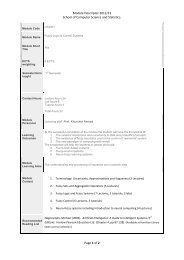MultiOS - Trinity College Dublin
MultiOS - Trinity College Dublin
MultiOS - Trinity College Dublin
Create successful ePaper yourself
Turn your PDF publications into a flip-book with our unique Google optimized e-Paper software.
Encouraging the Unexpected:<br />
Cluster Management for OS<br />
and Systems Research<br />
Ronan Cunniffe<br />
Brian Coghlan<br />
Europar’2000 31-AUG-2000
The Problem<br />
You OS guys crashed our cluster !<br />
Europar’2000 31-AUG-2000 <strong>Trinity</strong> <strong>College</strong> <strong>Dublin</strong>; Page 2
The Desire<br />
Crashes may be illuminating !<br />
OS research environment:<br />
• may not be stable<br />
• may be missing features<br />
Mmmm ….<br />
Separate cluster per project:<br />
• is inefficient<br />
• is expensive<br />
As clusters become more common, problem gets more acute<br />
Europar’2000 31-AUG-2000 <strong>Trinity</strong> <strong>College</strong> <strong>Dublin</strong>; Page 3
Existing vs <strong>MultiOS</strong> solutions<br />
Existing Solution<br />
OS #1<br />
OS #2<br />
OS #3<br />
OS #1<br />
OS #2<br />
OS #3<br />
OS #1<br />
OS #2<br />
OS #3<br />
Partition the local disk (dual/multiple boot)<br />
• all candidate environments must be there<br />
• no easy way to add another environment<br />
• assumes environments will not over-write others<br />
Time<br />
<strong>MultiOS</strong> Solution<br />
OS #1<br />
OS #2<br />
OS #1 out OS #2 in<br />
Import the environment each time (from remote disk)<br />
• can support any number of environments<br />
• no assumptions about stability or good behaviour<br />
• places great demands on network and remote disk<br />
….<br />
Time<br />
Europar’2000 31-AUG-2000 <strong>Trinity</strong> <strong>College</strong> <strong>Dublin</strong>; Page 4
<strong>MultiOS</strong><br />
How is it implemented?<br />
• standard mechanism for diskless workstations<br />
• alternate between management and user sessions<br />
• management software obtained over network<br />
• this then loads user image to local disk<br />
• user runs whatever environment is on the local disk<br />
• <strong>MultiOS</strong> considers this a black box<br />
Management software is Linux<br />
• can run from a RAM disk<br />
• advantages of a full OS + network-mounted filesystems<br />
• new tools can be written as necessary<br />
Europar’2000 31-AUG-2000 <strong>Trinity</strong> <strong>College</strong> <strong>Dublin</strong>; Page 5
Overall <strong>MultiOS</strong> architecture<br />
Console<br />
(WWW)<br />
Scheduler<br />
<strong>MultiOS</strong><br />
Server<br />
Image<br />
Server<br />
BOOTP<br />
Server<br />
TFTP<br />
Server<br />
Reset network<br />
Linux FS<br />
(<strong>MultiOS</strong><br />
client)<br />
Scheduling:<br />
• exclusive reservations by individual researchers<br />
• scheduler is a module, i.e. replaceable<br />
• <strong>MultiOS</strong> could be control mechanism within larger framework<br />
• requires a separate reset network !<br />
Europar’2000 31-AUG-2000 <strong>Trinity</strong> <strong>College</strong> <strong>Dublin</strong>; Page 6
Security<br />
Five principal issues:<br />
• BOOTP & TFTP are not secure<br />
• OS images are read-write accessible<br />
• how to keep private key secret on commodity PCs ?<br />
• the web server is not secure<br />
• distributed denial-of-service attacks<br />
Europar’2000 31-AUG-2000 <strong>Trinity</strong> <strong>College</strong> <strong>Dublin</strong>; Page 7
Summary<br />
<strong>MultiOS</strong> allows a cluster to be shared<br />
• for any number of different environments<br />
• for any type of research<br />
• see http://www.cs.tcd.ie/multios/<br />
Europar’2000 31-AUG-2000 <strong>Trinity</strong> <strong>College</strong> <strong>Dublin</strong>; Page 8


